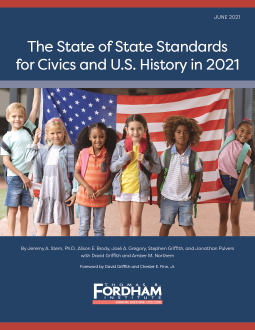Is America a racist country? Or the greatest nation on earth?
Such a divisive question leaves little room for the complexity, richness, and nuance of our country’s past and present. But it’s the sort of question that often seems to get asked in today’s polarized environment. It’s little wonder, then, that the tattered condition of civics and U.S. history education constitutes a national crisis. Various efforts—some wise, some hasty, some dangerous—are underway to repair the situation, but the logical place to start is with what states expect their schools to teach and their children to learn in these two key subjects.
To that end, The State of State Standards for Civics and U.S. History in 2021 evaluates the K–12 civics and U.S. History standards adopted by the fifty states and the District of Columbia based on the quality, completeness, and rigor of their content and the clarity of its presentation. Reviews were conducted by a bipartisan team of veteran educators and subject-matter experts with deep knowledge of civics and U.S. History.
Some key findings are as follows:
- Five jurisdictions (Alabama, California, Massachusetts, Tennessee, and the District of Columbia) were rated “exemplary” in both subjects.
- Another ten states were rated “good” in both subjects.
- Fifteen states were rated “mediocre” in at least one subject.
- Twenty states were rated “inadequate” in both subjects.
To ensure that every American student has access to a rich and balanced civics and U.S. History education, states are encouraged to
- Maximize attention to civics and U.S. History in elementary and middle school and require at least one year of U.S. History and one semester of Civics in high school;
- Provide comprehensive and detailed guidance in both subjects;
- Take a user-friendly approach to the organization and presentation of their standards; and
- Put more emphasis on writing, argumentation, problem analysis, and the connections between core content and current events.
The great purpose of civics and U.S. history education is to provide a common framework for resolving our differences even as we respect them—that is, to manage peacefully and constructively the eternal balancing and rebalancing of pluribus and unum. This report is one step in that direction.
For more on the findings, read the national report.
For more specific recommendations for all fifty states and D.C., click on your state below to navigate to its individual review.
How strong are your state's civics and U.S. history standards?






